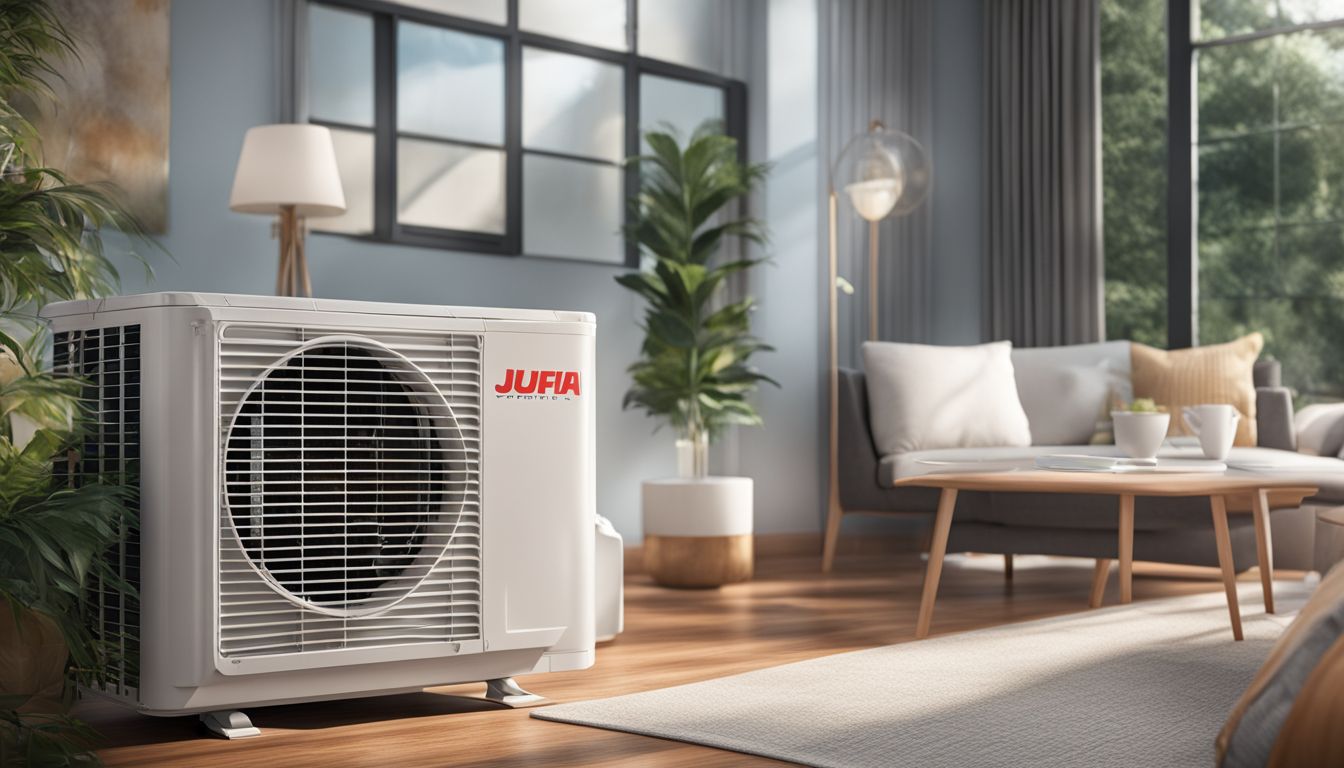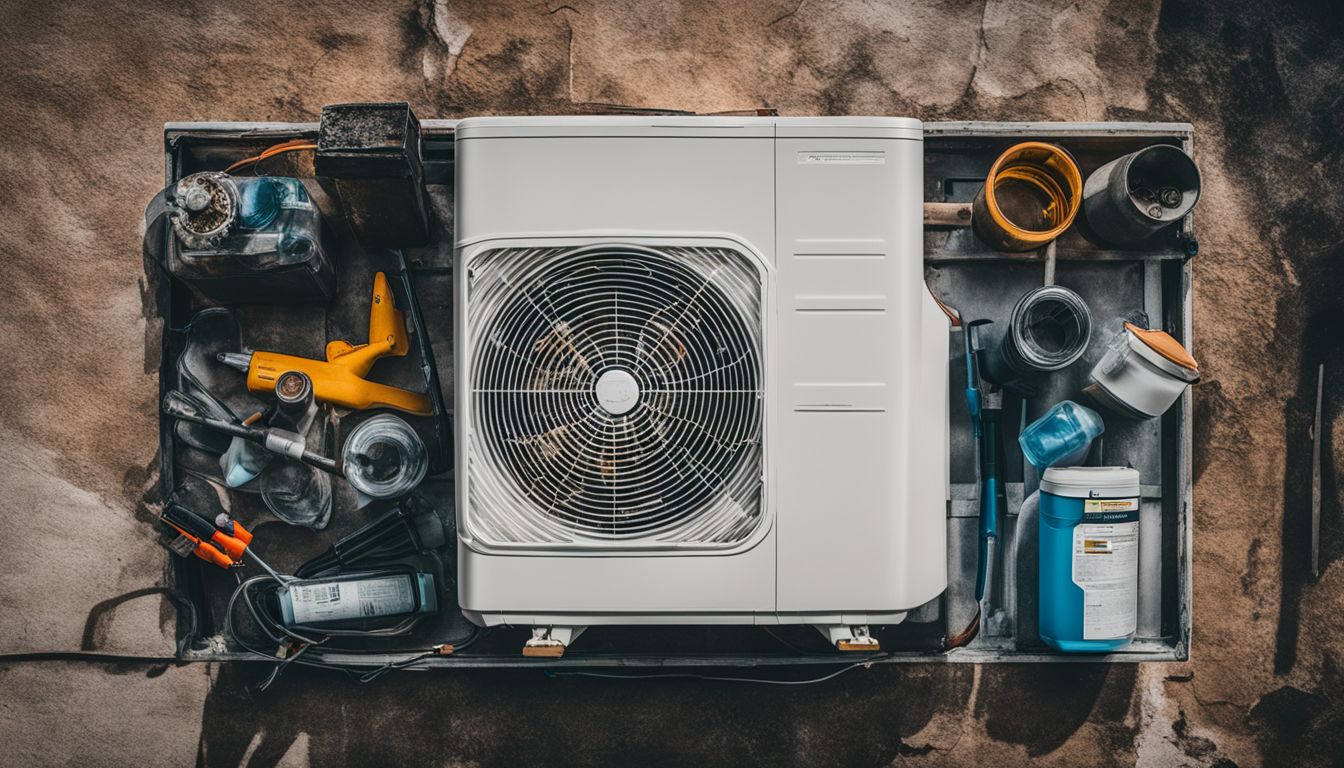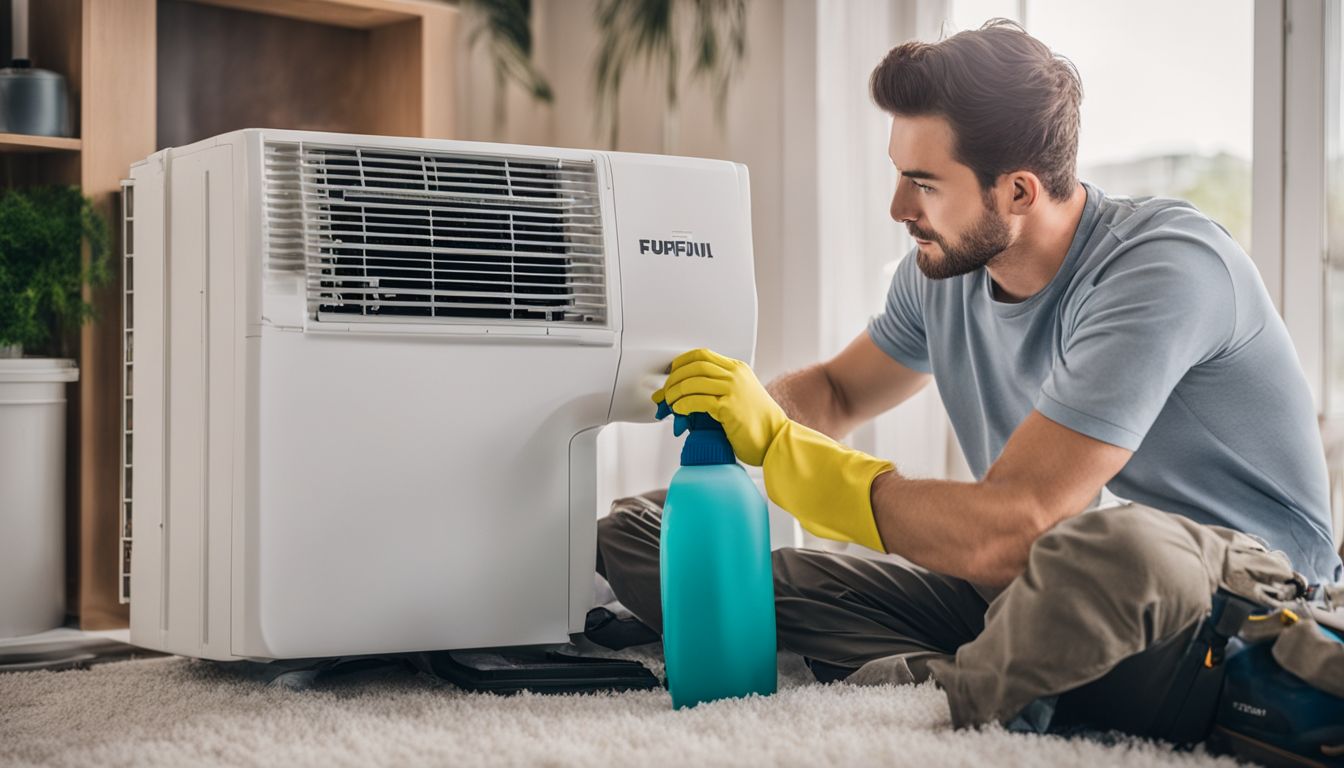Struggling with mould in your air conditioner can be a real headache. Chemical wash effectively tackles this common issue, ensuring your unit runs smoothly and efficiently.
Our article provides simple steps and tips to rid your aircon of harmful mould, improving the air quality in your home. Read on to learn how!
The Problem with Mould in Air Conditioners
Mould in air conditioners poses a significant threat to indoor air quality and can lead to various respiratory problems. As the cold air from these units meets the warm external environment, condensation forms, creating a perfect breeding ground for moulds.
This situation worsens in humid climates with high moisture levels, making air conditioning systems ideal places for mould spores to thrive.
These tiny spores then travel through the indoor environment, contaminating clean indoor air. For those with sensitivity or existing respiratory conditions like asthma, this contamination can trigger severe reactions ranging from runny noses to increased asthma attacks.
Regular maintenance and cleaning of air filters and evaporator coils are essential to preventing mould growth inside your home’s cooling equipment. Yet, many overlook this important preventative measure until unusual sounds or odours alert them to an issue within their system.
Chemical Wash: An Effective Solution for Mould
A chemical wash knocks out mould in air conditioning units with precision. It dives deep into the system, ensuring every nook is spick and span.
What is a Chemical Wash?
A chemical wash involves applying specific chemical agents to an air conditioning unit. These agents break down and remove impurities, including dirt, grime, and mould, from the system’s components.
This process ensures that dust, mould, and debris which affect air quality are meticulously eliminated. It targets the coils and pipes within the unit, eliminating all forms of build-up that can hamper efficiency.
The procedure cleans and kills mould and mildew, providing a hygienically clean system. Doing this removes foul odour and prevents future bacterial buildup in the aircon.
A thorough chemical wash enhances airflow and cooling efficiency while reducing energy consumption, leading to significant household savings. Through regular cleaning and preventative maintenance like this, air conditioners maintain their reliability over time without frequent repairs or replacements needed due to corrosion or other damage caused by neglect.
How Does it Combat Mould?
Chemical washes target mould by deeply cleansing the nooks and crannies within air conditioners, where mould thrives. These washes utilise solutions like sodium hypochlorite or chlorine bleach, known for their potent anti-mould properties.
They break down and flush out all traces of mould from the system, ensuring cleaner air is circulated.
This process removes existing mould and prevents its future growth by creating an environment that’s hostile to mould spores. Keeping areas like the heat exchange coils and condenser clean through chemical washing significantly boosts energy efficiency while maintaining optimal humidity control inside your space.
This approach guarantees improved air quality, creating a healthier environment free from allergens and bacteria.
Advantages and Disadvantages of Chemical Wash
Exploring the advantages and disadvantages of a chemical wash for air conditioners reveals a balanced view. Here’s a summarised comparison in a table format:
| Advantages | Disadvantages |
|---|---|
| Thoroughly removes built-up grime and dirt, ensuring clean air conditioner coils. | Chemical overhaul servicing costs are high due to expensive chemicals and tools. |
| Effectively kills mold and mildew, which are harmful to health. | Improper use of chemicals can potentially damage aircon components. |
| Significantly improves air quality by eliminating mold, dust, and bacteria. | Requires professional handling to ensure safety and effectiveness, limiting DIY efforts. |
| Prevents future build-up of dust and mould, prolonging the aircon’s lifespan. | Some chemicals used might be harmful to the environment if not disposed of properly. |
Tips for Safely Conducting a Chemical Wash
Conducting a chemical wash on your aircon is essential for ensuring clean air in your home. Safety precautions are crucial to protect yourself and the unit during this process.
- Wear protective gear: Before you start, make sure to put on safety equipment such as gloves, goggles, and a mask. This will shield you from harsh chemicals that could cause skin irritation or respiratory issues.
- Choose the right chemicals: Not all cleaning solutions are safe for your aircon unit. Select a chemical solution recommended for air conditioners to avoid damaging parts like the condenser coils or causing dangerous reactions like chlorine gas release.
- Turn off electricity: Always ensure the power supply to your unit is switched off before beginning any work. This prevents electric shocks and protects the system’s electronic components.
- Dismantle with care: Follow instructions or seek professional advice when taking apart your aircon. This step is vital for reaching every nook where mould can hide, but doing it wrong might lead to costly damage.
- Vacuum before washing: Use a vacuum cleaner to remove loose dust and debris from the unit’s interior parts. Doing so makes the chemical wash more effective in removing stubborn mould and gunk.
- Air filter cleaning: Wash or replace the air filters as part of your chemical wash routine to ensure optimal airflow and prevent mould spores from circulating back into your room.
- Properly rinse after washing: After applying the chemical solution, thoroughly rinse all components with water to remove any residual chemicals, which, if left, can corrode parts or affect air quality.
- Let everything dry completely: Before reassembling and turning on your aircon, ensure all parts are dry to prevent moisture build-up, which could encourage mould growth anew.
- Use an air freshener sparingly: After conducting an aircon chemical wash, you may be tempted to use an air freshener for that clean smell; however, opt for natural options or very mild fragrances to maintain indoor air quality without introducing potentially irritating chemicals.
When to Consult a Professional
Identifying when to call a professional for your aircon’s maintenance can save you from unintentional damage and ensure efficient heat transfer. Experts recommend seeking a professional chemical overhaul annually, tailored especially for units like mini-split or dehumidifier systems.
This routine check prevents potential issues from escalating into major repairs, safeguarding your home’s air quality and maintaining your system’s reputation for reliability.
Handling chemicals such as bleaches and other caustic agents demands expertise, as an incorrect application could harm the intricate electrical components inside your air conditioner. If you notice signs of mould beyond surface level or if the unit behaves unexpectedly—such as improper cooling or unusual sounds—a specialist should inspect it immediately.
They have the skills to diagnose issues accurately without compromising your health; undetected mould can be hazardous, potentially leading to respiratory illnesses like pneumonia.
Consulting a professional ensures that not only is mould eradicated, but your thermostat settings remain optimised for comfort and efficiency.
Conclusion

Chemical wash tactics stand as a robust defence against mould in air conditioners. They cleanse and refresh the system and improve air quality significantly. With regular maintenance, these methods can extend an AC unit’s lifespan while cutting down on electricity costs.
Embracing this approach ensures a healthier home environment free from harmful microbes. So, adopting chemical wash routines offers peace of mind, knowing your air is clean and your family is protected.
FAQs
1. What is a chemical wash for aircon?
A chemical wash involves using special cleaning agents to thoroughly clean your air conditioning unit, removing dirt, mould, and harmful bacteria.
2. Why should I consider getting my aircon chemically washed?
Chemical washing helps prevent mould growth in your aircon, ensuring it runs efficiently and keeping your home’s air clean and safe.
3. How often should I get my aircon chemically washed?
Experts recommend having a professional chemical wash done at least once a year to maintain optimal performance and hygiene levels.
4. Can I perform a chemical wash on my own aircon?
While it’s possible to do some basic cleaning yourself, professional services are advised for a full chemical wash because specialised chemicals and techniques ensure thorough cleaning without damaging your unit.





